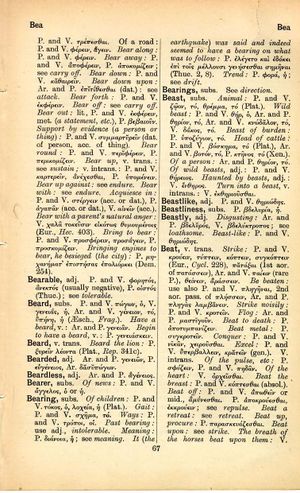beard: Difference between revisions
From LSJ
αὐτόματοι δ' ἀγαθοὶ ἀγαθῶν ἐπὶ δαῖτας ἴασι → automatically do the noble go to the feasts of the noble
(CSV3) |
m (Text replacement - "<b class="b2">Frag.</b>" to "''Frag.''") |
||
| Line 2: | Line 2: | ||
|Text=[[File:woodhouse_67.jpg|thumb|link={{filepath:woodhouse_67.jpg}}]]'''subs.''' | |Text=[[File:woodhouse_67.jpg|thumb|link={{filepath:woodhouse_67.jpg}}]]'''subs.''' | ||
P. and V. [[πώγων]], ὁ, V. [[γενειάς]], ἡ, Ar. and V. [[γένειον]], τό, [[ὑπήνη]], ἡ (Aesch., | P. and V. [[πώγων]], ὁ, V. [[γενειάς]], ἡ, Ar. and V. [[γένειον]], τό, [[ὑπήνη]], ἡ (Aesch., ''Frag.''). | ||
<b class="b2">Have a beard</b>, v.: Ar. and P. γενειᾶν. | <b class="b2">Have a beard</b>, v.: Ar. and P. γενειᾶν. | ||

